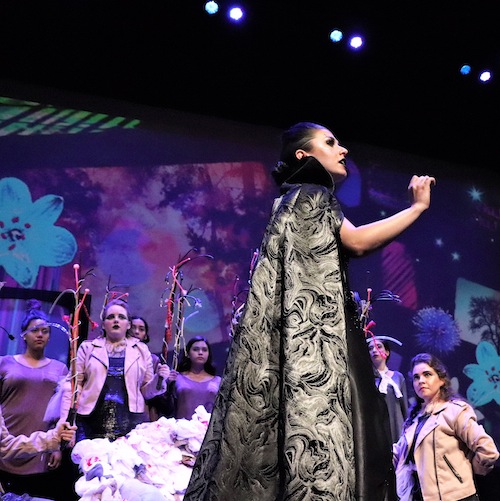Miami Music Fest delivers imaginative take on Britten’s “Dream”

Sara Law as Tytania in Benjamin Britten’s “A Midsummer Night’s Dream,” performed at the Miami Music Festival Thursday night. Photo: Angelica Perez
Benjamin Britten’s A Midsummer Night’s Dream is an enchanting operatic adaptation of one of William Shakespeare’s most magical plays. The increasingly ambitious Miami Music Festival brought Britten’s elaborate and musically intricate work to Barry University in Miami Shores on Thursday night. A highly gifted cast rendered this unique opus with dedication and theatrical flair in an audacious production.
Director Jennifer Williams has transferred Shakespeare’s romp in the woods to a post-apocalyptic landscape strewn with discarded remnants of the former civilization. Television monitors and Yee Eun Nam’s backdrop projection display the trees, flowers and global views that once were part of the milieu. In the tradition of Peter Brook’s famous Royal Shakespeare Company production of Shakespeare’s play, the singers playing mortals wear modern dress. The final scene at the Duke’s palace in Athens seems to come from another world as the royals’ luxuriant abode seems totally divorced from the devastation outside their walls. Oberon, Tytania and their entourage inhabit a fairy kingdom right out of Disney World.
Somehow this reinvention of the scenario works. Williams’ vision shapes the many characters’ personalities with a distinctive touch and a sure sense of theatricality. The subtle lighting by Stevie Agnew and Eve Bandi matches the changing tones and timbres of Britten’s music and Patricia Hibbert and Ashley Bombino’s contemporary costumes contribute smart stage pictures.
The libretto by Britten and his partner Peter Pears retains much of the Shakespearian English of the original text and it is to the credit of the well-drilled first-night cast that much of it was clearly intelligible.
Britten gave the role of Oberon some of the most delicate, ethereal music in the score, usually accompanied by celesta and lower strings. Keith Wehmeier’s countertenor voice was both strong and dulcet and he phrased the text with subtlety.
As Tytania, Sara Law’s striking stage presence and pinpoint high coloratura made every one of her scenes a standout. Under the spell of the flower’s potion, her love scene with the weaver Bottom, transformed into a donkey, was hilarious and her voice floated luminously over the elegant wind writing.
The quarreling pair of lovers are given some of the work’s most volatile and sensuous music. Gerard Ortega was a fervent Lysander with the ringing tenor to meet Britten’s high writing on its own terms. Merav Eldan had the dark mezzo timbre for Hermia and the good looks and theatrical chops of a Hollywood diva. Eldan and Ortega’s voices blended wonderfully in their evening prayer. As a black leather clad Demetrius, Richard Pupo securely projected the role’s low baritonal range but sometimes tended to force his attractive voice. Alexandra Sesenton’s soprano was alternately sweet and steely as the emotionally volatile Helena.
The music for the band of rustics is brusque and busy, a cross between neo-classical Stravinsky and bawdy folk song. Colin Anderson danced and pranced about the stage in a robust baritone as Bottom. Seemingly a born performer, Anderson played the comedy to the hilt with his donkey impersonation.
Shanyu Li was a vocally secure Peter Quince who seemed properly confused as director of Pyramus and Thisbe, the improvised play for the duke’s wedding. Logan Tarwater, Jeddiah Rellihan, Eric Asakawa and Eric Viñas were lively comic foils. In the speaking role of Puck, Oberon’s operative, Josue Brizuela was a spiky and athletic presence dressed like a rock star.
Christian Kas’s steady bass baritone was not always audible over the orchestra as Duke Theseus. Although her role is relatively small, Celina Cox, a stunning Madame Flora in The Medium last week, brought penetrating vocalism to Hippolyta’s lines. Special kudos to Madeline Coffey, Elaine Herder, Jennifer Wilson, Annette Sayre and Renata Kapilevich who brought fine ensemble skills and witty characterizations to Tytania’s attendants.
Some of the most beautiful music in the opera is scored for the children’s chorus of fairies. The opening “Over hill, over dale” resounds winningly. “You spotted snakes” finds Britten at his most British, accompanied by lively percussion. In the opera’s finale, “Now until the break of day” Tytania, Oberon, her attendants and the fairies exquisitely cap a unique and enchanting opus. Composed mostly of members of the Doral Conservatory Children’s Chorus, the fairies’ choir rose to the occasion, singing with fine heft and variegated dynamics.
Conductor Christopher Ocasek’s astutely judged pacing and fine balancing brought out the colors of the orchestral scoring. The student orchestra’s playing was excellent. All credit to Steven Garcia’s clarion solo trumpet (that accompanies Puck’s every appearance) and the silky strings in the night music prelude to Act III.
Britten’s Midsummer Night’s Dream has finally come to Miami. There is one remaining performance (with some cast changes) and opera aficionados should not miss the opportunity to hear this major 20th century work.
The Miami Music Festival repeats A Midsummer Night’s Dream 7:30 p.m. Saturday at Barry University Broad Performing Arts Center in Miami Shores. miamimusicfestival.com
Posted in Performances
2 Responses to “Miami Music Fest delivers imaginative take on Britten’s “Dream””
Leave a Comment
Fri Jun 29, 2018
at 1:29 pm
2 Comments

Posted Jun 30, 2018 at 2:18 pm by Giselle
Very beautiful performances. Wonderful Childrens’s Chorus!
Posted Jun 30, 2018 at 5:27 pm by David Goulet
Congratulations, Shanyu, you’re off to a good start.